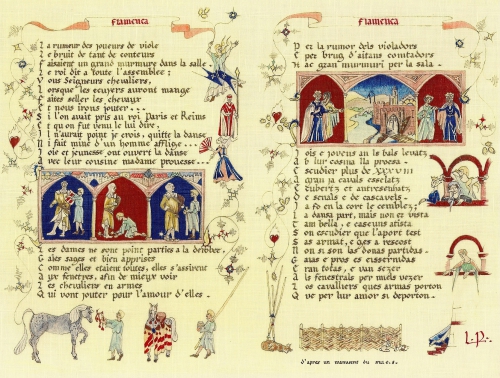ADVENTURES - Groupe OC
An incredible organisation promoting all things Occitan
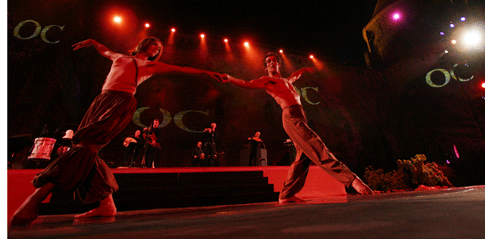
I think my previous life, the mayor of a small village in the Narbonnais, would be delighted if he could see how far and how wonderfully the Occitan scene has developed in Narbonne today.
I have discovered a web-site called www.ocmusic.org that even switched automatically into English for me in the boutique! It says;
Founded in 1999 by Christian Salès, OC aims to promote Occitanian culture through artistic creations. Our troupe comprises musicians, dancers, artists and sound and image engineers specialising in digital technologies. With true Occitanian open-mindedness, OC participates in an eclectic array of projects, ranging from audiovisual recordings to live shows. OC's own creations include music, films and artefacts from the Land of Oc.
There's a lot on this site, take your time to look at it. For a fantastic taster, Narbonne as you have never seen it before, click here.
You will be amazed at the way modern techniques have been used to create this taste of Occitania in the middle of old Narbonne.
One day . . .
I visited the great abbey church at Alet-les-Bains that was built by Bera, of Visigothic descent, of the County of Razès (ruled from Rennes-le-Château.) One goes in via the Tourist Office, but you can wander around the abbey and the chapter house on your own and take lots of pictures. I was fascinated by some of the carvings.
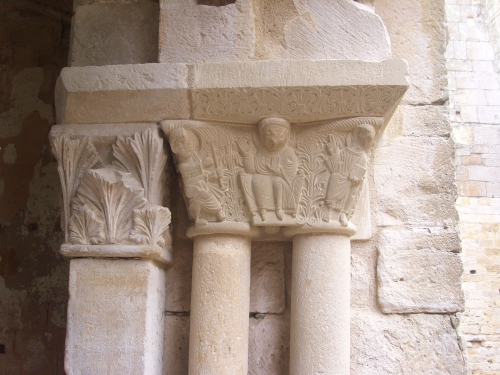
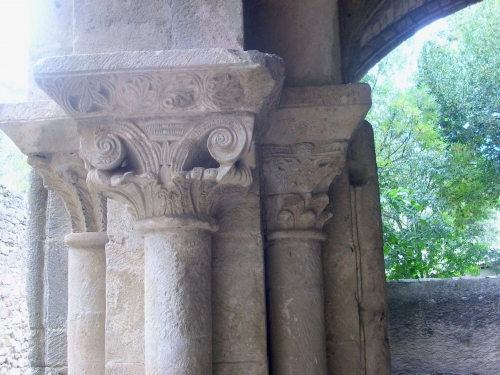
They are from the Chapter House, which is very well preserved.
To read more about Alet-les-Bains, with fantastic pictures, then click here.
We returned to the Tourist office, and I bought a manuscript, a copy of part of a 13th century story called "Flamenca" from the Municipal Library of Carcarcassonne, among a selection delightfully done by the artist Lise Parramon.
Isn't it beautiful? French on the left, Occitan on the right. This is just the opening lines of Flamenca, a full-length Occitan novel. I could translate the French. It said;
The hum of violin players and the noise of the telling of tales
made a great murmur in the hall.
The king said to all assembled; You Lord Knights,
when the grooms, having eaten, have saddled the horses
Let us go to joust . . .
If one had taken the king of Paris or Reims and told him to come along
I believe he could not have left the dance nor looked like an afflicted man . . .
Joy and Youth have opened the dance, with their cousin, Madame Wonderful . . . .
The ladies were not those to hide themselves,
they were all gay, knowing and well learned.
They sat by the windows, all the better to see the knights at arms,
who were going to joust for the love of them.
Note the double negatives, and all the meaning in the last line. This is typically Occitan. They did it all for the love of the ladies. You can read more about Flamenca here and also here. Flamenca and the art of love.
Carcassonne and Occitan music
The Occitan and troubadour culture as we know it today began in Carcassonne, perhaps even in pre-Christian days, when traders brought their goods and their music, originally from Indian, up through Spain to the Celtic oppidums. So it's right and fitting that Group Oc hold a music festival in Carcassonne every year.
Click for the film. When I watched and listened to this I got such a thrill listening to the incredible voice of the singer; it was very moving. He is singing for his sweetness far away, he is lonely and misses his lovers, the mountains must lower themselves so his lovers can return.
Then I had a conversation with Luigi Oliviero about Occitan music, for Luigi is also a musician. He said; I see by your profile you're enjoying your new Albigesian Crusade book. (Click here.) Unfortunately all troubadours' music is lost and all the songs you hear from Group Oc and similar groups is modern. There are only 3 manuscripts (one in Milan) with extant troubadour's melodies noted. The problem is that we know the notes but NOT their length so, they are not very useful. I can use the same notes and give the different durations and I will obtain VERY different results. It is a tragedy this music is lost!
I replied; At first glance it DOES seem to be "popularised" and your comment about the music is interesting, because so many people, who think they are reincarnated from Cathars, tell me they recognise this music! (I recount a similar incident for myself in my book.) "La Canso" is a beautiful book although the original texts are only extracts. Meanwhile here is a serious article about Occitan music, made by the official Occitan studies people in Montpellier. Click here
Luigi replied; Here you are, a picture of the so called Chansonnier "G" stored in the Biblioteca Ambrosiana in Milan (Italy) signed as "R71 superiore". As you can see you have the word and the music BUT unfortunately, from this kind of notation, you can only read what note is played (C, E, F etc...) and their sequence/order, but not the duration of each single note. If you have just the notes but NOT their related duration, you cannot identify the melody but just create a new one respecting the order/sequence of the notes and giving them a related duration according your taste or according to a "theory" which gives different results according to what this theory is.
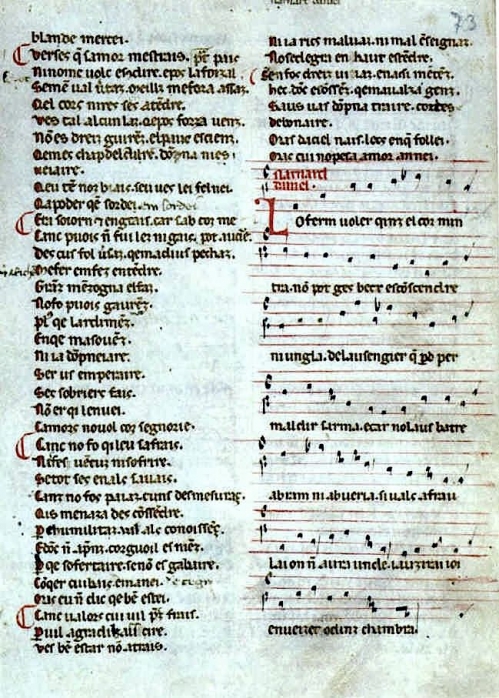
This is a subject in which I studied deeply and I am sorry, as musician and scholar, to tell you that the melodies of the Troubadours are lost forever but this is the reality. Do you go to see the Oc group's shows? they are so beautiful. They have certainly succeeded with their shows and their music but - Scholars are well aware that the troubadours’ melodies were just dots on the classic five lines without the detail, such as minims or crochets plus harmony as one sees today. It is not really the "Music of the Troubadours" as described, but it is very good all the same.
I replied; (Defending Groupe OC to the end!) It's as though this music (as shown in the old manuscript) was a sort of reminder, it's the words and a suggested tune. It implies that most troubadours played "by ear." I once knew someone with no musical training at all, who could sit down at a piano and reproduce almost any song. Playing “by ear” is a great mystery to me. When I was learning music, I could play it but only found "the feeling" later.
Most troubadours must have been "natural" musicians, they must have learned from hearing the song or from each other. The great poets of the aristocracy were a different thing again, being educated, and also great entertainers, holding their audience in their hands. In today’s world of TV and muzak we must remember every castle held a community which included tumblers, jesters, musicians and troubadours, whose job was sometimes to make the king or queen laugh.
Christian Sales of Group Oc is popularising Occitan music from all ages. Maybe we cannot know if the early music is “authentic”, it might be anyway, but there's an emotion behind it that evokes something in us all. Many "reincarnated" Cathars feel they know the songs, but certainly it all resonates with me, I find it very moving, and I know they do too.
But we do not know what the feelings were of people 800 years ago. It is fascinating that ordinary Cathars lived such awful lives that they found no problem in dying, a concept people today, who want to live forever, find hard to understand.
Christian Sales is sincere, and he is also a showman, however, he works hard at what he does, it's his life work! I sent him a note to say thanks for the book and he wrote back as though we were long-lost friends. He writes like a novelist with the emotional "hook" working overtime! PS Is that an 8-string guitar he is playing in the picture??
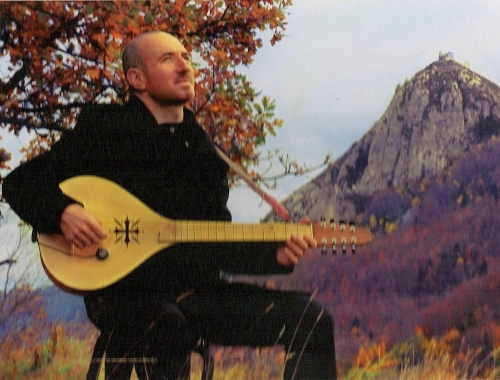
Then I sent Luigi some pages scanned from the book.
Luigi replied; I don't know the instrument, it is probably an ancient instrument created from an illumination or painting. He is honest, he says he wrote the melodies and Peter Petjik made the orchestration, he just says he was "inspired" by the Crusade poem, so, the last judge is only your ear: if you like it and he likes it, that’s ok. I also use the same criterion, I don't categorise music into rock, blues, opera, symphony, only into what my ears like and don't like.
Ancient troubadours did not use the orchestra (polyphonic music did not exist at the time) but probably modern ones would. So I'm sure Christian is sincere in bringing Occitan music to us so beautifully well.
For more of Christian's music on his site in English, click here.
To see the latest news, a visit to the home of Mistral, click here
Inscrivez-vous au blog
Soyez prévenu par email des prochaines mises à jour
Rejoignez les 28 autres membres

